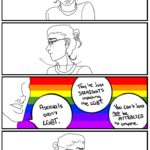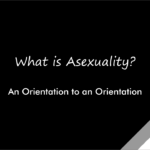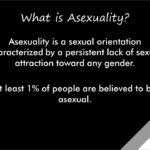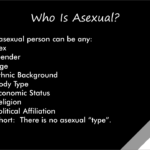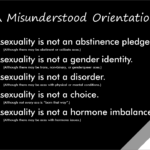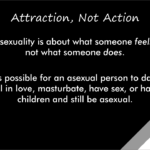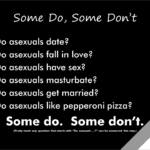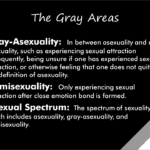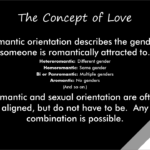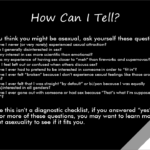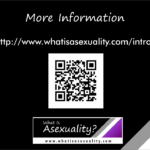I’m biologically female, and I’m not attracted to men. Society told me I was supposed to be, but it never happened, and I spent years of my life feeling broken and wrong. The other option presented to me when I was young was being attracted to women. I watched girls closely, trying to figure it out, but that wasn’t working for me, either. Wanting to be sexually close to another person just baffled me. I swore everyone else was making those feelings up. But they weren’t, and I got older, I realized that and it sunk in that I was just one big weirdo. I was in college when I learned the word for it, and had a breakdown of panic and relief. I can’t begin to put into words how it felt to discover I wasn’t broken–that I was a part of a group of people who felt in their hearts and souls the way I did.
Then came the process of coming out. My friends were a mixed bag, but friends you can pick and choose from if they aren’t supportive.The vast majority of my friends were cool about it, even if they didn’t quite understand. There were assholes, and one suggested “showing me” I was wrong (creepy creepy creepy), but mostly my friends were neutral to positive.
After some select friends, I came out to my family.
My parents told I was wrong.
It was like being run over by a truck. To this day, I can’t talk about my asexuality around those I love most. It caused one of the only serious arguments I’ve ever had with my parents (I love them and they’re wonderful about 99.9% of the things in my life, but this is one place they weren’t). I was told I just had to find the “right person”, and I would change. That I was too young to understand my feelings (I was in my 20s) towards boys. That I shouldn’t put labels on myself that would make men not want to date me. Because god forbid men not find me attractive! Because clearly, from my conversation with them, what I wanted most of all was to find a man who wanted to get in my pants! Yeah!
Yeah.
It’s not really their fault. We live in a world where happiness is defined as falling in love, getting
married, etc. Not wanting another person in your life as your “other
half” is an alien concept. Media is flooded with messages of heterosexual normalcy, and now in very small pockets (hopefully growing, because it should! <3), a homosexual option for partnered normalcy. It’s shoved in our faces CONSTANTLY. Our society and government
have even set things up to benefit couples financially.
Which is fun now that I’m in my 30s and trying to save up for a future family, all by myself. And thankfully, even though they still avoid the word, over a decade later my parents do seem on board with the fact that I’m not pursuing relationships and are supportive of my life choices to save for a family by myself.
Listen. I am by no means saying that I am oppressed as a person the way people attracted to same-gendered people are. I’m not saying I’m oppressed the way the trans community is. I’m not saying any of that. But I AM dealing with a world where who I am is just not “okay”. Where who I am is wrong, where who I am needs to be fixed. Or, in many cases (most cases), where who I am DOES NOT EXIST. I don’t belong in the heterosexual world. I’m an outsider to it. But I’m also an outsider to any world that involves sex and attraction. And as a youth, I had NO WORD to use to describe who I was!
So when asexuals advocate for asexual inclusion in the LGBT community, it’s not because we want to weirdly steal thunder from anyone in your community, or because we want false pity for oppression we haven’t faced the way you have. It’s because we don’t want others to have to grow up the way we did.
We don’t want the world to continue not knowing about our existence. We want asexuality recognized publicly–both so asexuals can learn about themselves in an honest way, and so non-aces see us as legitimate humans. The LGBT world seemed like the natural place for us to go to to ask for inclusion. The place where others might understand what it’s like to grow up in a heterosexual world, as someone who is not. It’s who I first turned to when I discovered the word for myself, only to find immediate pain, rejection, and even mockery. I was horrified.
But I didn’t give up. I couldn’t give up. In 2005, I was in college and gave a talk at my university’s LGBT club. They had never heard of asexuality before, despite being part of a huge liberal university. It was the scariest thing I’d ever done in my life. I had to introduce the concept, and represent the entire community. And then answer a barrage of questions. Personal, personal questions, about my body, my life experiences, everything. And at the end, there was a long period silence. Until one brave person said:
“Wow. You have gone through the same things as us. You said you had some pamphlets about it? Can we put them in our office? People need to know about this. I can’t imagine growing up not knowing about homosexuality. As scary as it was for me, at least I had a word for it.”
I broke down crying and gave them all the pamphlets I had ordered. Many of them started crying, too. We became a blubbering mess in that meeting room. In that moment, I thought I had found a community who understood after all.
Did I? I suppose that’s up to you. But please, take some of this into consideration before you say that asexuals shouldn’t have a letter in your acronym, or should make their “own, separate” community. We’re unknown and invisible in so many ways, but nevertheless hurting in ways I think many of you can sympathize with and understand. It’s not that we’re attracted to the “wrong” sex or gender. It’s that we’re not attracted to the “right” one. And holy crap, the world just isn’t super friendly or understanding to people like that. Like us.
Thank you.


